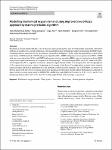Item Infomation
Full metadata record
| DC Field | Value | Language |
|---|---|---|
| dc.contributor.author | Adnan, Rana Muhammad | - |
| dc.contributor.author | Dai, Hong-Liang | - |
| dc.contributor.author | Kisi, Ozgur | - |
| dc.date.accessioned | 2023-08-04T09:00:34Z | - |
| dc.date.available | 2023-08-04T09:00:34Z | - |
| dc.date.issued | 2023 | - |
| dc.identifier.uri | https://link.springer.com/article/10.1007/s11356-023-28935-6 | - |
| dc.identifier.uri | https://dlib.phenikaa-uni.edu.vn/handle/PNK/8693 | - |
| dc.description | CC-BY | vi |
| dc.description.abstract | Biochemical oxygen demand (BOD) is one of the most important parameters used for water quality assessment. Alternative methods are essential for accurately prediction of this parameter because the traditional method in predicting the BOD is time-consuming and it is inaccurate due to inconstancies in microbial multiplicity. In this study, the applicability of four hybrid neuro-fuzzy (ANFIS) methods, ANFIS with genetic algorithm (GA), ANFIS with particle swarm optimization (PSO), ANFIS with sine cosine algorithm (SCA), and ANFIS with marine predators algorithm (MPA), was investigated in predicting BOD using distinct input combinations such as potential of hydrogen (pH), dissolved oxygen (DO), electrical conductivity (EC), water temperature (WT), suspended solids (SS), chemical oxygen demand (COD), total nitrogen (TN), and total phosphorus (T-P) acquired from two river stations, Gongreung and Gyeongan, South Korea. | vi |
| dc.language.iso | en | vi |
| dc.publisher | Springer | vi |
| dc.subject | BOD | vi |
| dc.subject | ANFIS | vi |
| dc.title | Modelling biochemical oxygen demand using improved neuro-fuzzy approach by marine predators algorithm | vi |
| Appears in Collections | ||
| OER - Khoa học môi trường | ||
Files in This Item:

